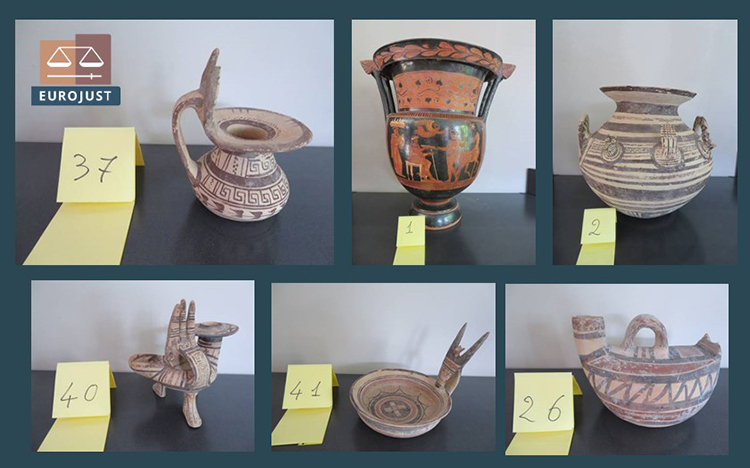Crime
Italian Authorities Have Seized Nearly 800 Illicit Ancient Artifacts Worth $13 Million From a Single Belgian Collector
The probe has been ongoing since 2017.

The probe has been ongoing since 2017.

Caroline Goldstein

Italian police have recovered almost 800 illegally obtained archaeological objects dating from the sixth century B.C., worth €11 million ($13 million)—all from the hands of one Belgian collector.
The artifacts were taken from unauthorized excavations in Puglia, a region in southern Italy. Among them is a rare funerary artifact made of limestone known as a Daunian stele, which had previously been on view at exhibitions in Paris and Geneva, along with various amphorae and other pieces of pottery.
A statement from Italy’s Carabinieri police force in charge of cultural heritage noted that the pieces are “of exceptional rarity and inestimable value.” Authorities have released a video of them collecting the looted objects for safekeeping.
Officials have been monitoring the collection since at least 2017, when an archaeology lab in Puglia noticed similarities between the Daunian stele illustrated in an art catalogue and those held in the Archaeological Museum of Trinitapoli in southern Italy. The works pictured in the catalogue for a show in Geneva were listed as the property of “a wealthy Belgian collector,” reports AFP.
Upon further investigation, officials from the lab noted that the collector’s stele was missing a large piece from its middle, and that a fragment within the museum’s collection depicting a shield and warrior on horseback completed the missing piece.
The initial discovery gave police reason to search the collector’s home in Antwerp, where they found a trove. “During the course of the search, a veritable ’archaeological treasure’ was recovered, consisting of hundreds of Apulian figurative ceramic finds and other Daunian stelae, all illegally exported from Italy, which were then seized in Belgium,” according to a statement from police.
Eurojust, the European Union Agency for Criminal Justice Cooperation, helped establish cooperation between Italian and Belgian authorities, who executed the return of the entire collection to Italy, where further examination into the works, which date to between 600 and 300 B.C., will be carried out.